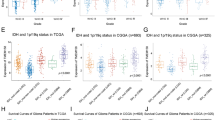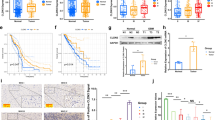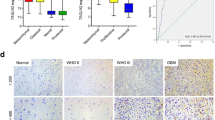Abstract
Background
Glioblastoma (GBM) is the most aggressive form of glioma. However, the treatment of GBM remains largely ineffective. LTBP2 is a secreted extracellular matrix protein involved in the progression of multiple tumors. However, the role and mechanism of LTBP2 in glioma remain unknown.
Objective
To uncover the possible effects of LTBP2 on the progression of gliomas and explore its underlying mechanism.
Results
LTBP2 was highly expressed in glioma. LTBP2 knockdown inhibited the growth of glioma cells. Downregulation of LTBP2 suppressed glioma cell motility. LTBP2 knockdown restrained the PI3K/AKT/mTOR pathway. LTBP2 knockdown suppressed glioma growth and migration and tumor growth in mice through the PI3K/AKT/mTOR axis.
Conclusion
LTBP2 could serve as a potential therapeutic target for the treatment of gliomas.






Similar content being viewed by others
Data availability
All data generated or analyzed during this study are included in this published article.
The datasets used and/or analyzed during the present study are available from the corresponding author on reasonable request.
References
Bae SJ, Lee SH, Yun SJ, Kim K (2021) Usefulness of the blood urea nitrogen-to-serum albumin ratio as a prognostic indicator of severity in acute ischemic stroke. Signa Vitae 17:163–170
Barra F et al (2019) Investigational PI3K/AKT/mTOR inhibitors in development for endometrial cancer. Expert Opin Investig Drugs 28:131–142
Barzegar Behrooz A et al (2022) Wnt and PI3K/Akt/mTOR survival pathways as therapeutic targets in glioblastoma. Int J Mol Sci 23(3):1353
Camilloni A et al (2021) Chronic non-cancer pain in primary care: an Italian cross-sectional study. Signa Vitae 7:54–62
Chan SH et al (2011) The ECM protein LTBP-2 is a suppressor of esophageal squamous cell carcinoma tumor formation but higher tumor expression associates with poor patient outcome. Int J Cancer 129:565–573
Chang KF et al (2020) Cedrol suppresses glioblastoma progression by triggering DNA damage and blocking nuclear translocation of the androgen receptor. Cancer Lett 495:180–190
Chen HX et al (2020) Novel mutations of TCTN3/LTBP2 with cellular function changes in congenital heart disease associated with polydactyly. J Cell Mol Med 24:13751–13762
El Atat O et al (2023) Molecular targeted therapy: a new avenue in glioblastoma treatment. Oncol Lett 25:46
Fan Y, Zeng F, Ma L, Zhang H (2021) Effects of beta-carboline alkaloids from peganum harmala on the FAK/PI3K/AKT/Mtor pathway in human gastric cancer cell line SGC-7901 and tumor-bearing mice. Pak J Pharm Sci 34:891–898
Huang Y et al (2019) High expression of LTBP2 contributes to poor prognosis in colorectal cancer patients and correlates with the mesenchymal colorectal cancer subtype. Dis Markers 2019:5231269
Luan Y et al (2023) Mitophagy and traumatic brain injury: regulatory mechanisms and therapeutic potentials. Oxid Med Cell Longev 2023:1649842
Mendanha D et al (2023) Macrophage cell membrane infused biomimetic liposomes for glioblastoma targeted therapy. Nanomed Nanotechnol Biol Med 49:102663
Moren A et al (1994) Identification and characterization of LTBP-2, a novel latent transforming growth factor-beta-binding protein. J Biol Chem 269:32469–32478
Nishimura S et al (2023) The T2-FLAIR mismatch sign in glioblastoma, isocitrate dehydrogenase wild-type A case report. Acta Radiologica Open 12:20584601231184564
Tian Z, Sun C, Liu J (2022) Pelargonidin inhibits vascularization and metastasis of brain gliomas by blocking the PI3K/AKT/mTOR pathway. J Biosci 47:64
Wang C et al (2017) Latent transforming growth factor beta binding protein 2 (LTBP2) as a novel biomarker for the diagnosis and prognosis of pancreatic carcinoma. Med Sci Monit : International Medical Journal of Experimental and Clinical Research 23:3232–3239
Wang J et al (2020) The circEPSTI1/mir-942-5p/LTBP2 axis regulates the progression of OSCC in the background of OSF via EMT and the PI3K/Akt/mTOR pathway. Cell Death Dis 11:682
Wang L et al (2021) Alnustone inhibits the growth of hepatocellular carcinoma via ROS- mediated PI3K/Akt/mTOR/p70S6K axis. Phytother Res : PTR 36(1):525–542
Wang J et al (2022) Inhibition of FAM83D displays antitumor effects in glioblastoma via down-regulation of the AKT/Wnt/beta-catenin pathway. Environ Toxicol 37(60):1343–1356
Wang T et al (2022) LTBP2 knockdown promotes ferroptosis in gastric cancer cells through p62-Keap1-Nrf2 pathway. Biomed Res Int 2022:6532253
Wang M et al (2023) Dengzhan Shengmai capsule attenuates cardiac fibrosis in post-myocardial infarction rats by regulating LTBP2 and TGF-beta1/Smad3 pathway. Phytomedicine : International Journal of Phytotherapy and Phytopharmacology 116:154849
Yao W et al (2020) Delicaflavone induces ROS-mediated apoptosis and inhibits PI3K/AKT/mTOR and Ras/MEK/Erk signaling pathways in colorectal cancer cells. Biochem Pharmacol 171:113680
Yeh LT, Hsu LS, Chung YH, Chen CJ (2020) Tectorigenin inhibits glioblastoma proliferation by G0/G1 cell cycle arrest. Medicina 56(12):681
Zhang HQ et al (2021) Erianin inhibits human lung cancer cell growth via PI3K/Akt/mTOR pathway in vitro and in vivo. Phytotherapy Research : PTR 35:4511–4525
Zhao J et al (2022) The prognostic significance of LTBP2 for malignant tumors: Evidence based on 11 observational studies. Medicine 101:e29207
Acknowledgements
Thanks to all the peer reviewers for their opinions and suggestions.
Funding
Not applicable.
Author information
Authors and Affiliations
Contributions
All authors contributed to the study conception and design. Material preparation and the experiments were performed by Yonghui Zhang. Data collection and analysis were performed by Yue Qin. The first draft of the manuscript was written by Xiaochen Yu and all authors commented on previous versions of the manuscript. All authors read and approved the final manuscript.
Corresponding author
Ethics declarations
Competing interests
Author Yonghui Zhang declares that he/she has no conflict of interest; author Yue Qin declares that he/she has no conflict of interest; author Xiaochen Yu declares that he/she has no conflict of interest.
Ethics approval
Ethical approval was obtained from the Ethics Committee of Xinjiang Medical University Affiliated Traditional Chinese Medicine Hospital.
Additional information
Publisher's Note
Springer Nature remains neutral with regard to jurisdictional claims in published maps and institutional affiliations.
Rights and permissions
Springer Nature or its licensor (e.g. a society or other partner) holds exclusive rights to this article under a publishing agreement with the author(s) or other rightsholder(s); author self-archiving of the accepted manuscript version of this article is solely governed by the terms of such publishing agreement and applicable law.
About this article
Cite this article
Zhang, Y., Qin, Y. & Yu, X. Decreased LTBP2 expression inhibits proliferation and migration of glioma. Mol. Cell. Toxicol. (2024). https://doi.org/10.1007/s13273-024-00447-5
Accepted:
Published:
DOI: https://doi.org/10.1007/s13273-024-00447-5




